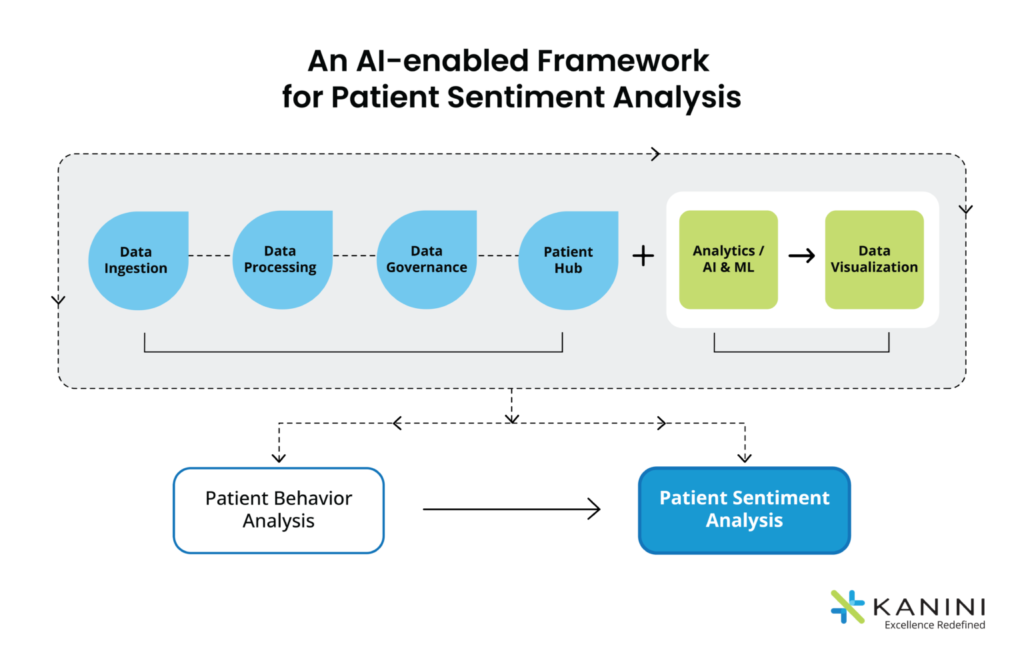The healthcare industry is a competitive market and healthcare providers today are very well aware that to stay ahead in the game, it is crucial to focus on improving patient care experience and hence it is important to evaluate how the patients truly feel about the care delivery.
It’s the age of social media, digital surveys, online reviews, and ratings. Patients can express their opinions freely, and share their feedback about the quality of service they received with just a click of a button. SurveyVitals’ study shows that 36% of patients leave at least one comment in digital surveys. It is these comments or opinions – both positive, negative, or neutral – that are a gold mine for healthcare providers, allowing them to gain deep insight into the patient care experience.
The opinions shared by patients help the healthcare provider to identify problem areas, take corrective measures promptly, and serve patients better. A proactive response by the provider to a patient’s positive comments or concerns is like the cherry on a cake – instantly making the patient feel valued through this enhanced patient engagement and garnering more positive reviews that encourage new patients to join in.
But healthcare providers often face a big challenge of managing a high volume of patient sentiment data. Analyzing this big data using traditional processes is quite tedious and inefficient – it is like finding a teardrop in the ocean. This is where AI-driven sentiment analysis takes center stage. Let us discuss how we can utilize AI for patient sentiment analysis that helps make better business decisions.
First, the 3 vital steps – Identify. Extract. Analyze.
Sentiment analysis needs a 3-step approach of identifying, extracting, and then analyzing patient sentiment data to understand whether it is positive, negative, or neutral. This is followed by taking necessary steps based on the inferences drawn. It is also called opinion mining. Studying patient opinions and drawing actionable insights from them enables healthcare providers to know the patient well, understand how a patient feels about the different services they are being offered, evaluate their needs, and improve to build a strong patient-provider relationship and brand image in the long run.
Some challenges that healthcare providers should be aware of –
- A large volume of patient sentiments data are shared across numerous online platforms
- Unstructured data can be quite difficult to handle and analyze
- A big communication gap between providers and patients regarding the services offered
- Lack of technologically advanced infrastructure/tools to manage and analyze a large volume of patient opinions
- Obsolete workflows that make data analysis inaccurate, cumbersome, and cost-intensive
- Absence of adequate and skilled manpower to serve patients efficiently, leading to negative reviews
- Usage of rudimentary patient communication systems that cannot understand patient feedback/sentiments
So, how can a healthcare provider overcome these challenges to manage and analyze patient sentiments efficiently?
This is where conversational Artificial Intelligence (AI), Machine Learning (ML), Natural Language Processing (NLP), biometrics, computational linguistics, and text analytics come into the picture.
These technologies are well-poised to change the face of the healthcare industry. They enable healthcare providers to align their operations to new-age customer-centric principles and offer a far more positive experience to patients. AI-enabled patient sentiment analysis or patient opinion mining is an important component of this modern holistic service approach and impacts customer satisfaction.
According to a report by Marketsandmarkets, artificial intelligence in the healthcare market is projected to grow to USD 67.4 billion by 2027, growing at a CAGR of 46.2% from 2021 to 2027.

AI/ML-driven Patient Sentiment Analysis through Opinion Mining
2019 NEJM Catalyst study states that 97% of physicians/staff agree that listening to patient’s feedback/ voice helps improve care management. So, it’s all about listening to what your patients have to say, and more importantly, listening intelligently. AI-enabled Opinion Mining tools such as Conversational AI and Aspect-based patient sentiment analysis just do that. These tools automate the process of sentiment analysis by analyzing large volumes of free-text patient feedback/opinions to arrive at quantitative sentiment scores super fast.
With an AI/ML-driven Patient Opinion Mining framework, the Healthcare provider can:
- Analyze patient behavior
- Get deep insights into a patient’s sentiments about a service received
- Extract a Patient Sentiment Analysis Report
- Take immediate actions for course corrections on a service, if any
- Recommend the right services to the patient more proactively.
1. Conversational AI for Patient Sentiment Analysis
Conversational AI is one such AI-driven tool that combines NLP with chatbots, voice assistants, or voice recognition systems, to serve customers (Read: patients) through a vocal or digitally-written interface. The role of Conversational AI in patient opinion mining has been phenomenal for the healthcare industry in recent years.
An example of how Conversational AI has been transforming healthcare businesses:
A Pain Management Clinic in Florida turned around its business with the help of Conversational AI.
Short of staff, technology, and infrastructure, a Pain Management Clinic was struggling to offer its patients quality healthcare services. Patient footfall was decreasing, not many positive reviews were coming in from patients, and consequently, the new patient acquisition was also at its lowest. The Management of the Clinic was unable to identify where they were going wrong and how they could improve to change their patients’ perceptions. The Clinic was running into losses and a shutdown was being considered.
So they decided to employ Conversational AI to understand their patient’s feedback more efficiently. With the 24X7 availability of the Clinic’s chatbot, things got brighter – patients were far more connected and that made them feel happy. They could easily schedule appointments, follow up on reports, receive reminders and alerts, enquire about medication, and most importantly they could share their opinions freely. With the Chatbot, there was always someone there to lend them an ear. In a few months, they started receiving more data about their patients’ feedback and sentiments and were able to make adjustments to their services proactively. The Management now knew its patients better. They could understand their needs, address problem areas in the clinic and improve holistically.
Understanding and meeting patient expectations is crucial for the success of a healthcare organization. AI can help you achieve this objective.
2. Aspect-Based Patient Sentiment Analysis
Aspect-based Patient Sentiment Analysis is another very effective AI-driven tool that uses a text analysis technique to categorize patient opinions by aspects or attributes of a healthcare service and identify the sentiment associated with each of these aspects. Aspect-based Patient Sentiment Analysis can deliver two things –
- Sentiments/opinions – positive or negative about a particular aspect of the business
- Aspect – the category or subject matter of the opinion.
Here’s a use case to help you understand how Aspect-based Patient Sentiment Analysis can help your healthcare business thrive.
A hospital in Ohio was very active on social media, particularly on Twitter. That was a great way for the business to connect with its audience. In a matter of a few months, there was a sea of mentions – patient reviews, feedback, opinions on what a particular patient liked about the hospital and a few complaints. This was all very valuable information, and the hospital was able to make great use of this data to draw insights regularly and continuously enhance the patient experience to expand further – thanks to the Aspect-Based Patient Sentiment Analysis tools that enabled the hospital with the following –
- Automatic analysis of patient sentiments in detail
- Real-time data analysis – early detection and prompt problem fixing
- Consistent evaluation for each aspect through a Centralized aspect analysis model
- In-depth understanding of patient expectations to serve them better
What does AI-driven patient sentiment analysis yield?
Patient sentiment analysis evaluates patient sentiment data and gives you answers to questions like these –
- Did the patient like the service?
- What part of the service did he like?
- Which service made the patient unhappy?
- Did the patient’s sentiments change from last time?
- What are my improvement areas?
- What do I need to enhance to transform the customer (Read: Patient) experience?
- How many negative/positive reviews did I receive?
These are just some of the countless questions that you can address with the help of AIdriven sentiment analysis tools and work your way towards building a far more efficient, proactive, and patient-centric healthcare practice.
Why is Patient Sentiment Analysis Important for Your Healthcare Business?
To bridge the gap between patient expectations and subsequent perceptions
- Patient-centered care through actionable insights
- Prompt and effective analysis of patient feedback
- Real-time assessment
- Efficient data scouring and data-filtering
- Accurate evaluation of business strengths and weaknesses
- Identification of improvement areas and latest trends
- Future strategy building and planning
- Enhanced Patient satisfaction through prompt corrective steps
- Improved patient retention
- Avoid patient no-shows
Prerequisites of Adopting AI/ ML-driven Tools for Patient Sentiment Analysis
If you are considering switching over from traditional processes to smarter AI-enabled tools that can analyze your patients’ sentiments far more efficiently, draw meaningful insights and steer your business in the right direction, you must consider the following prerequisites –
- Robust Data Platform
- Single View of a Patient
- Competent IT Team
- Past Few Years of Data
- Past Survey Data
The End-goal – To create a better patient experience.
Evaluating patient feedback is the key to understanding your patients better. By knowing how your patient truly feels about your brand, you can improve your processes, address problems, and stay ahead in the highly competitive healthcare space. Patient sentiment analysis is not something you do once and then call it a day! It is a continuous process and as a care provider, it is important to stay on top of it. Efficient and continual Patient Opinion Mining using AI-driven tools can empower you to offer the best healthcare experience to your patients. Detailed sentiment analysis reports generated by AI-driven tools can help you take prompt strategic decisions, and remedial measures to improve patient experience and generate the desired patient engagement.
We at KANINI offer Cloud-based AI solutions for automatic and insightful patient sentiment analysis. Contact us to know more about how we can help your healthcare business grow by leveraging AI-driven data analysis.
Author

Anand Subramaniam
Anand Subramaniam is the Chief Solutions Officer, leading Data Analytics & AI service line at KANINI. He is passionate about data science and has championed data analytics practice across start-ups to enterprises in various verticals. As a thought leader, start-up mentor, and data architect, Anand brings over two decades of techno-functional leadership in envisaging, planning, and building high-performance, state-of-the-art technology teams.








